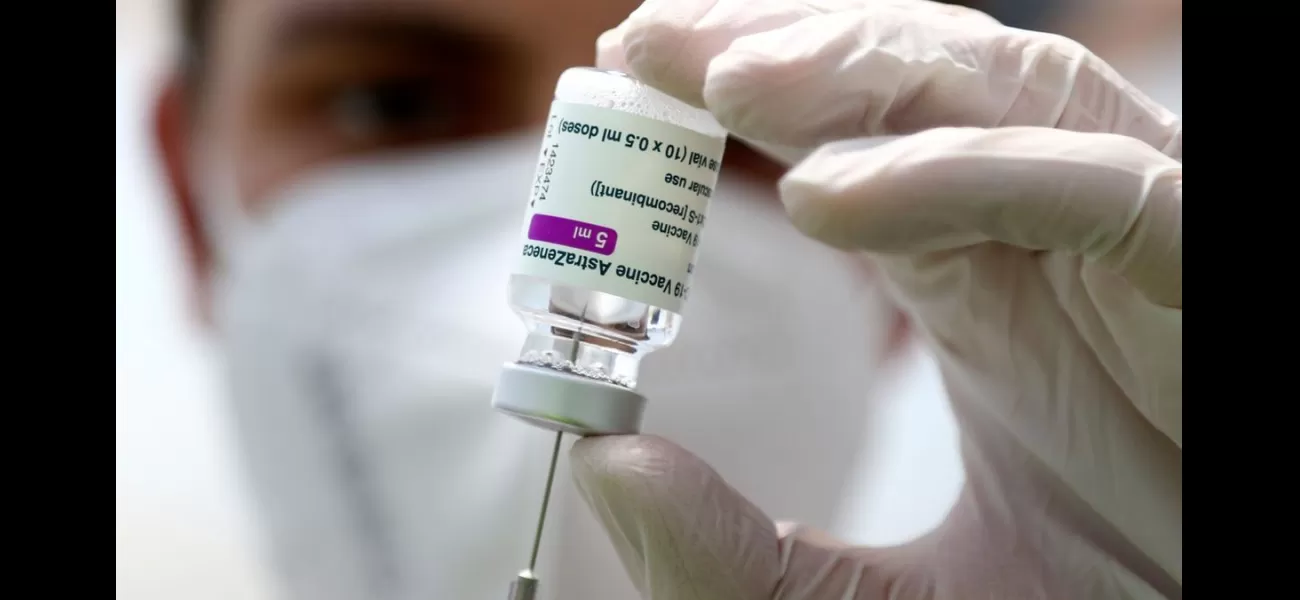COVID-19 vaccine can cause a rare blood disease, according to a recent study.
Australian scientists found something important for better vaccine safety.
May 15th 2024.

New Text:
According to recent findings from Australian researchers, there seems to be a connection between a particularly risky complication of the COVID-19 vaccine and a rare but potentially fatal blood disease that is typically contracted by those who have recently come down with a cold. The team from Flinders University in Adelaide revealed that the antibodies present in both conditions, known as vaccine-induced immune thrombocytopenia and thrombosis (VITT) and adenovirus VITT-like disorder, share almost identical molecular signatures or "fingerprints."
Professor Tom Gordon, from Flinders University, stated that this discovery was made possible through a new approach to targeting blood antibodies developed by the university. He explained that this suggests a common trigger present in both the virus and the vaccine that leads to the production of pathological PF4 antibodies. "In fact, the pathways for producing these lethal antibodies are likely to be very similar and may have similar genetic risk factors," he added.
The research was prompted by the emergence of VITT as a complication in some rare cases following the administration of certain COVID-19 vaccines, including the Oxford-AstraZeneca shot used in Australia. "VITT was found to be caused by an unusually dangerous blood autoantibody that targets a protein called platelet factor 4," Flinders University said in a statement.
Interestingly, a separate study conducted by experts from North America and Europe last year found a nearly identical blood disease with the same PF4 antibody, which proved to be fatal for some individuals who had recently suffered from a common cold. Dr. Jing Jing Wang and Professor Tom Gordon from Flinders University led a study in 2022 that successfully decoded the molecular structure of the PF4 antibody and identified a genetic risk factor, according to the university's statement.
The teams from Flinders University and overseas collaborated to compare their findings and were able to confirm the presence of similar molecular "fingerprints." Their findings were published in the New England Journal of Medicine today. Both Gordon and Wang emphasized the significance of their research in improving the safety of vaccines. "Our findings have important clinical implications as the lessons learned from studying VITT can also be applied to rare cases of blood clotting after adenovirus infections. Additionally, this research has implications for the development of future vaccines," Gordon stated.
According to recent findings from Australian researchers, there seems to be a connection between a particularly risky complication of the COVID-19 vaccine and a rare but potentially fatal blood disease that is typically contracted by those who have recently come down with a cold. The team from Flinders University in Adelaide revealed that the antibodies present in both conditions, known as vaccine-induced immune thrombocytopenia and thrombosis (VITT) and adenovirus VITT-like disorder, share almost identical molecular signatures or "fingerprints."
Professor Tom Gordon, from Flinders University, stated that this discovery was made possible through a new approach to targeting blood antibodies developed by the university. He explained that this suggests a common trigger present in both the virus and the vaccine that leads to the production of pathological PF4 antibodies. "In fact, the pathways for producing these lethal antibodies are likely to be very similar and may have similar genetic risk factors," he added.
The research was prompted by the emergence of VITT as a complication in some rare cases following the administration of certain COVID-19 vaccines, including the Oxford-AstraZeneca shot used in Australia. "VITT was found to be caused by an unusually dangerous blood autoantibody that targets a protein called platelet factor 4," Flinders University said in a statement.
Interestingly, a separate study conducted by experts from North America and Europe last year found a nearly identical blood disease with the same PF4 antibody, which proved to be fatal for some individuals who had recently suffered from a common cold. Dr. Jing Jing Wang and Professor Tom Gordon from Flinders University led a study in 2022 that successfully decoded the molecular structure of the PF4 antibody and identified a genetic risk factor, according to the university's statement.
The teams from Flinders University and overseas collaborated to compare their findings and were able to confirm the presence of similar molecular "fingerprints." Their findings were published in the New England Journal of Medicine today. Both Gordon and Wang emphasized the significance of their research in improving the safety of vaccines. "Our findings have important clinical implications as the lessons learned from studying VITT can also be applied to rare cases of blood clotting after adenovirus infections. Additionally, this research has implications for the development of future vaccines," Gordon stated.
[This article has been trending online recently and has been generated with AI. Your feed is customized.]
[Generative AI is experimental.]
0
0
Submit Comment





